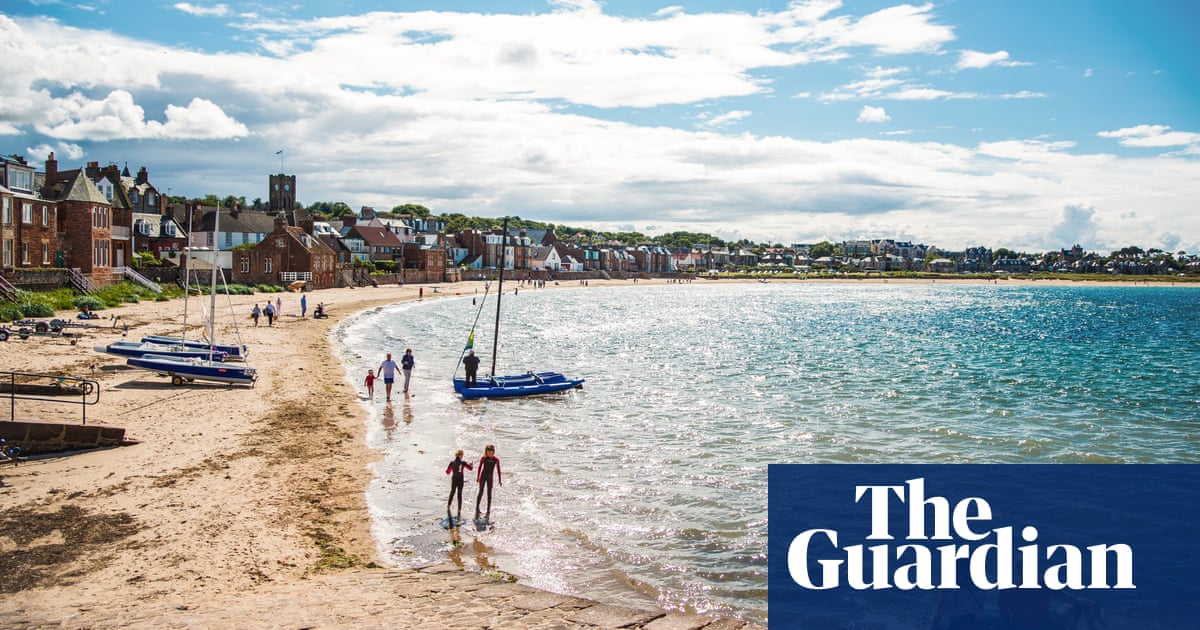
o matter how much you miss theatre, you still wouldn’t want to see Lakes Sister, an earnest one-woman show about Dorothy Wordsworth at the Edinburgh fringe. It’s one of several woeful productions we see in Annie Griffin’s 2005 film Festival, shot in the Scottish capital in August so the city’s background buzz is real, even if the acts are not.
Faith, played by Lyndsey Marshal, is barely off the National Express before she’s flyering. “I wandered lonely as a cloud,” she warbles, as punters push past on the Royal Mile and the bagpipes drone on. “William, the daffodils!” she later gasps on stage from beneath a bonnet. “See how they bend in the wind!”
You wouldn’t fancy checking out her friend’s lunchtime production, about a paedophile priest, either. Or the cringeworthy experimental offering of a Canadian physical-theatre troupe that gives Faith a transcendental experience. Apparently things aren’t much better over at the feted Traverse theatre. They’ve got three actors doing monologues and none of them even look at each other, sneers journalist Dougie (Tom Goodman-Hill).
How about some comedy instead? Loathsome superstar standup Sean Sullivan is in town (portrayed with villainous relish by Stephen Mangan) but he’s principally here to judge the awards and enjoy a fling (with Nicky, a comic played by Lucy Punch as a queen of the withering putdown). Tommy (Chris O’Dowd) is hoping that it will be ninth year lucky for his observational comedy routines, while his pal Conor (Billy Carter) has some new half-hearted material with a puppet sidekick. Conor and Tommy share a winning conversation in the pub about the right amount of preshow booze to consume: six pints, says Tommy, is just enough to oil the gags. Plus a chaser, proposes Conor.
Among the festival throng are a jaded broadcaster (Daniela Nardini) and Sullivan’s long-suffering PA (Raquel Cassidy). There are also cameos for a handful of comedians including Matthew Holness and, playing an awards panellist, Richard Ayoade, both of whom were nominated for the comedy prize a few years earlier.
If the sites of Edinburgh are familiar so is the emotional landscape of ambition, rivalry and poleaxing self-doubt that, as the month rolls on, is more wearying than a run to the top of Arthur’s Seat. Acts fret about not getting reviewed, or fret about bad reviews, or fret away critiquing their own show in the pub each night. The film’s black comedy often grows downright bleak.
We’re told that a festival that was once about “Polish street theatre – the human condition!” has been overrun by monstrous standups. Griffin’s script presents the worlds of comedy and theatre as mutually exclusive – the former is usually boorish, cruel and blokeish (Nicky is the only female award nominee), the latter is po-faced, pretentious or ridiculous. But the film was shot in the summer of 2004 when Will Adamsdale, a master at both theatre and comedy, won the Perrier for Jackson’s Way. These days, acts such as Richard Gadd, Elf Lyons and Desiree Burch create work that might be listed in either of those sections in a festival programme; the same was true back then with Daniel Kitson.
Festival is a patchy film – some of the interweaving storylines fall flat while the balance of uproarious and upsetting material doesn’t quite come off. But the episodic narrative is akin to the pick’n’mix fringe experience, where a dud show could be followed by a belter, and where the longueurs and high points from the performances you catch slowly begin to merge into one fuzzy impression of that year’s festival. The fringe has grown to such a size that no one else will share that particular impression.
There is plenty of alcohol-fuelled shagging along the way in Festival with closeups of cunnilingus, handjobs, a bit of fisting and lots of bums. Griffin captures the sweaty business of performing, too, in all those dank and cramped fringe venues. Mind you, in her tiny room, Faith’s paltry audience numbers still facilitate plenty of social distancing. Will the fringe be back this year after its 2020 Covid cancellation? Looking at the crowded streets, bars and gigs in the film, it’s hard to believe it will be possible. All of which accentuates Festival’s poignant brew of despair and optimism, isolation and community.
The Edinburgh fringe has its cynics but Griffin – an American émigré who took shows there regularly in the 1980s – manages to lampoon the acts and the wider industry around theatre and comedy, while still championing its founding passion for performance. She combines both an insider and outsider’s perspectives. Edinburgh, wrote Griffin when the film was released, “is a place for people who will perform no matter what … a place for actors to inflict their talent on a willing public”. And theatre at the festival, often either free or cheap, welcomes all sorts of audiences, with less of a suggestion that it is an elite activity.
It’s not just Faith who emerges as a true believer in the power of art. Griffin writes in a role for one of the residents who rent out their home for the summer; New Town dweller Micheline (Amelia Bullmore) lets her fancy flat to the Canadians who rummage through her wardrobe for stage outfits. But unexpectedly, Micheline, who is disconnected from her family life, falls for the blissed out troupe’s powers of expression. The film’s moving final scene belongs to Faith, though, as she sprints towards her theatre. It is as exhilarating in its own way as Renton’s run down Princes Street in the opening of Trainspotting.












